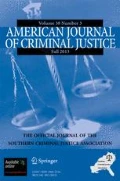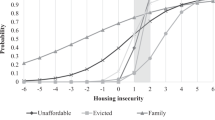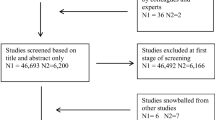Abstract
Of the more than two million persons incarcerated in U.S. prisons, the majority are also parents to children under the age of 18. A growing body of research has explored the impact of parental incarceration on these children and has consistently found a link between this experience and negative life outcomes. Fewer studies, however, examined the longitudinal impact of parental incarceration on offspring. This analysis attempts to address this shortcoming by exploring the relationship between parental incarceration during childhood and adult outcomes later in life. More specifically, we examine the associations between paternal incarceration during childhood and health, educational, and economic outcomes in young adulthood. Using data from the Add Health, we utilize a series of regression analyses to examine these relationships. Results suggest that parental incarceration is significantly related to a number of outcomes in early adulthood, including educational attainment, physical and mental health, and receipt of public assistance.
Similar content being viewed by others
Notes
We also employ the use of sample weights which help to correct for design effects in the publicly available sample. All analyses were conducted using IBM SPSS Statistics Version 22 and STATA 11.
Only 63 respondents reported that there biological mother had ever been jailed. Furthermore, when a measure of parental incarceration was constructed (by combining maternal and paternal incarceration information), only 28 additional respondents were coded as “1” as compared to the paternal incarceration measure. As such, we examine only the impact of paternal incarceration in this study.
Items were reverse-coded when appropriate and depended on the wording of the original question.
Logit models were used to estimate bivariate relationships between paternal incarceration and dichotomous outcomes while t-tests are reported for the income and health problems measures.
References
Aaron, L. C., & Dallaire, D. H. (2010). Parental incarceration and multiple risk experiences: effects on family dynamics and children’s delinquency. Journal of Youth and Adolescence, 39(12), 1471–1484.
Arditti, J. A., Lambert-Shute, J., & Joest, K. (2003). Saturday morning at the jail: implications of incarceration for families and children. Family Relations, 52(3), 195–204.
Baumeister, R. F., & Heatherton, T. F. (1996). Self-regulation failure: an overview. Psychological Inquiry, 7, 1–15.
Beaver, K. M. (2012). The familial concentration and transmission of crime. Criminal Justice and Behavior, 49(2), 139–155.
Cho, R. M. (2009). Impact of maternal imprisonment on children’s probability of grade retention. Journal of Urban Economics, 65, 11–23.
Cho, R. M. (2011). Understanding the mechanism behind maternal imprisonment and adolescent school dropout. Family Relations, 60(3), 272–289.
Codd, H. (2008). In the shadow of prison: Families, imprisonment, and criminal justice. Portland: Willan Publishing.
Comfort, M. (2008). Doing time together: Love and family in the shadow of the prison. Chicago: The University of Chicago Press.
Dallaire, D. H. (2007). Children with incarcerated mothers: developmental outcomes, special challenges and recommendations. Journal of Applied Developmental Psychology, 28(1), 15–24.
Dallaire, D. H., & Aaron, L. C. (2010). Middle childhood: Family, school, and peer contexts for children affected by parental incarceration. In J. M. Eddy & J. Poehlmann (Eds.), Children of incarcerated parents: A handbook for researchers and practitioners. Washington, DC: The Urban Institute.
Dallaire, D. H., & Wilson, L. C. (2010). The relation of exposure to parental criminal activity, arrest, and sentencing to children’s maladjustment. Journal of Child and Family Studies, 19(4), 404–418.
Dallaire, D. H., Ciccone, A., & Wilson, L. C. (2010). Teachers’ experiences with and expectations of children with incarcerated parents. Journal of Applied Developmental Psychology, 31(4), 281–290.
Eddy, J. M., & Poehlmann, J. (2010). Children of incarcerated parents: A handbook for researchers and practitioners. Washington, DC: The Urban Institute Press.
Foster, H., & Hagan, J. (2007). Incarceration and intergenerational social exclusion. Social Problems, 54, 399–433.
Foster, H., & Hagan, J. (2009). The mass incarceration of parents in America: issues of race/ethnicity, collateral damage to children, and prisoner reentry. The Annals of the American Academy of Political and Social Science, 623, 179–194.
Foster, H., & Hagan, J. (2013). Maternal and paternal imprisonment in the stress process. Social Science Research, 42, 650–669.
Fowler, F. (2009). Survey research methods (4th ed.). Thousand Oaks: Sage.
Gabel, K., & Johnston, D. (1995). Children of incarcerated parents. New York: Lexington Books.
Geller, A., Garfinkel, I., Cooper, C. E., & Mincy, R. B. (2009). Parental incarceration and child well-being: Implications for urban families. Social Science Quarterly, 90(5), 1186–1200.
Geller, A., Cooper, C. E., Garfinkel, I., Schwartz-Soicher, O., & Mincy, R. B. (2012). Beyond absenteeism: father incarceration and child development. Demography, 49(1), 49–76.
Gottfredson, M. R., & Hirschi, T. (1990). A general theory of crime. Stanford: Stanford University Press.
Hagan, J., & Foster, H. (2012). Intergenerational school effects of mass imprisonment in America. Sociology of Education, 85(3), 259–286.
Hanlon, T. E., Blatchley, R. J., Bennett-Sears, T., O’Grady, K. E., Rose, M., & Callaman, J. M. (2005). Vulnerability of children of incarcerated addict mothers: implications for preventive intervention. Children and Youth Service Review, 1, 67–84.
Harris, K. M. (2009). The national longitudinal study of adolescent health (Add Health), waves I & II, 1994–1996; Wave III, 2001–2002; Wave IV, 2007-2009 [machine-readable data file and documentation]. Chapel Hill: Carolina Population Center, University of North Carolina at Chapel Hill.
Huebner, B. M., & Gustafson, R. (2007). The effect of maternal incarceration on adult offspring involvement in the criminal justice system. Journal of Criminal Justice, 35(3), 283–296.
Johnson, R. (2009). Ever-increasing levels of parental incarceration and the consequences for children. In S. Raphael & M. Stoll (Eds.), Do prisons make us safer?: The benefits and costs of the prison boom. New York: Russell Sage.
Johnston, D. (1995). Effects of parental incarceration. In K. Gabel & D. Johnson (Eds.), Children of incarcerated parents. New York: Lexington Books.
Kelley, M. S., & Peterson, J. L. (1997). The national longitudinal study of adolescent health (Add Health), waves I & II, 1994–1996: A user’s guide to the machine-readable files and documentation(Data Sets 48-50, 98, A1-A3). Los Altos: Sociometrics Corporation, American Family Data Archive.
Kinner, S. A., Alati, R., Najman, J. M., & Williams, G. M. (2007). Do paternal arrest and imprisonment lead to child behaviour problems and substance use? A longitudinal analysis. Journal of Child Psychology and Psychiatry, 48(11), 1148–1156.
Lee, R. D., Xiangming, F., & Luo, F. (2013). The impact of parental incarceration on the physical and mental health of young adults. Pediatrics, 131(4), e1188–e1195.
Miller, H. V., & Barnes, J. C. (2013). Genetic transmission effects and intergenerational contact with the criminal justice system: a consideration of three dopamine polymorphisms. Criminal Justice and Behavior. doi:10.1177/0093854812468434. Online First.
Miller, H. V., Barnes, J. C., & Beaver, K. M. (2011). Self-control and health outcomes in a nationally representative sample. American Journal of Health Behavior, 35(1), 15–37.
Mumola, C. J. (2000). Incarcerated parents and their children. Washington, DC: Bureau of Justice Statistics.
Murrary, J., & Farrington, D. P. (2005). Parental imprisonment: effects on boys’ antisocial behaviour and delinquency through the life-course. Journal of Child Psychology and Psychiatry, 46(12), 1269–1278.
Murrary, J., & Farrington, D. P. (2008a). The effects of parental imprisonment on children. In M. Tonry (Ed.), Crime and justice: A review of research. Chicago: University of Chicago Press.
Murrary, J., & Farrington, D. P. (2008b). Parental imprisonment: long-lasting effects on boys’ internalizing problem through the life course. Development and Psychopathology, 20(1), 273–290.
Murrary, J., Farrington, D. P., Sekol, I., & Olsen, R. F. (2009). Effects of parental imprisonment in child antisocial behavior and mental health: A systematic review. Cambridge: The Campbell Collaboration.
Murrary, J., Loeber, R., & Pardini, D. (2012). Parental involvement in the criminal justice system and the development of youth theft, marijuana use, depression and poor academic performance. Criminology, 50, 255–302.
Nesmith, A., & Ruhland, E. (2008). Children of incarcerated parents: challenges and resiliency, in their own words. Children and Youth Services Review, 30(10), 1119–1130.
Pakiz, B., Reinherz, H. Z., & Gioconia, R. M. (1997). Early risk factors for serious antisocial behavior at age 21: a longitudinal community study. American Journal of OrthoPsychiatry, 67(1), 92–101.
Parke, R. D., & Clarke-Stewart, K. A. (2001). Effects of parental incarceration on young children. Washington, D.C: Working Paper Presented at “From Prison to Home” Conference January 30-31, 2002.
Peniston, D. A. (2006). The effects of parental incarceration on children: An examination of delinquency and criminality, school performance and alcohol and drug usage. Arlington: University of Texas at Arlington.
Phillips, S. D., Burns, B. J, Wagner, R. H., Kramer, T. L., & Robbins, J. M. Parental incarceration among adolescents receiving mental health services. Journal of Child and Family Studies, 11(4), 385-399
Poehlmann, J. (2005). Representations of attachment relationships in children of incarcerated mothers. Child Development, 76(3), 679–696.
Pratt, T. C., & Cullen, F. T. (2000). The empirical status of gottfredson and hirschi’s general theory of crime: a meta-analysis. Criminology, 38, 931–964.
Roettger, M. E. (2008). Three essays on social inequality and the U.S. criminal justice system. Unpublished Ph.D. Dissertation. Chapel Hill, NC: University of North Carolina at Chapel Hill.
Roettger, M. E., & Boardman, J. (2012). Parental imprisonment and gender-based risks for increased BMI: evidence from a longitudinal study of adolescents and young adults in the U.S. American Journal of Epidemiology, 175(7), 636–644.
Roettger, M. E., & Swisher, R. R. (2011). Associations of fathers’ history of incarceration with sons’ delinquency and arrest among black, white, and hispanic males in the United States. Criminology, 41, 109–1147.
Roettger, M. E., Swisher, R. R., Kuhl, D. C., & Chavez, J. (2011). Parental incarceration and trajectories of drug use from adolescence to young adulthood. Addiction, 106, 121–132.
Shlafer, R. J., & Poehlmann, J. (2010). Attachment and caregiving relationships in families affected by parental incarceration. Attachment and Human Development, 2(4), 395–415.
Stanton, A. M. (1980). When mothers go to jail. Lexington: Lexington Books.
Stroble, W. L. (1997). The relationship between parental incarceration and african-american high school students’ attitudes towards school and family. Unpublished Ph.D. Dissertation, Department of Sociology, College of William and Mary, Virginia.
Tangney, J. P., Baumeister, R. F., & Boone, A. L. (2004). High self-control predicts good adjustment, less pathology, better grades, and interpersonal success. Journal of Personality, 72, 271–324.
Tourangeau, R., & Shin, H. C. (1999). Grand sample weight. Chapel Hill: Carolina Population Center: University of North Carolina.
Travis, J. & Waul, M. (Eds.). (2004). Prisoners once removed: the impact of incarceration and reentry on children, families, and communities. The Urban Institute.
Trice, A. D., & Brewster, J. (2004). The effects of maternal incarceration on adolescent children. Journal of Police and Criminal Psychology, 19(1), 27–35.
Uggen, C., & Manza, J. (2004). Voting and subsequent crime and arrest: evidence from a community sample. Columbia Human Rights Law Review, 36, 193–215.
Wakefield, S. (2007). The consequences of incarceration for parents and children. Unpublished Ph.D. Dissertation, Department of Sociology, University of Minnesota, Minneapolis.
Wakefield, S., & Wildeman, C. (2011). Mass imprisonment and racial disparities in childhood behavioral problems. Criminology and Public Policy, 10, 791–817.
Western, B., Kling, J. R., & Weiman, D. F. (2001). The labor market consequences of incarceration. Washington, D.C: Working Paper #450 Presented at Urban Institute’s Re-entry Roundtable, October 12-13, 2000.
Wildeman, C. (2009). Paternal incarceration, the prison boom, and the concentration of disadvantage. Demography, 46(2), 265–280.
Wildeman, C. (2010). Paternal incarceration and children’s physically aggressive behaviors: evidence from the fragile families and child wellbeing study. Social Forces, 89, 285–310.
Acknowledgments
This research uses data from Add Health, a program project directed by Kathleen Mullan Harris and designed by J. Richard Udry, Peter S. Bearman, and Kathleen Mullan Harris at the University of North Carolina at Chapel Hill, and funded by grant P01-HD31921 from the Eunice Kennedy Shriver National Institute of Child Health and Human Development, with cooperative funding from 23 other federal agencies and foundations. Special acknowledgment is due Ronald R. Rindfuss and Barbara Entwisle for assistance in the original design. Information on how to obtain the Add Health data files is available on the Add Health website (http://www.cpc.unc.edu/addhealth). No direct support was received from grant P01-HD31921 for this analysis.
Author information
Authors and Affiliations
Corresponding author
Rights and permissions
About this article
Cite this article
Miller, H.V., Barnes, J.C. The Association Between Parental Incarceration and Health, Education, and Economic Outcomes in Young Adulthood. Am J Crim Just 40, 765–784 (2015). https://doi.org/10.1007/s12103-015-9288-4
Received:
Accepted:
Published:
Issue Date:
DOI: https://doi.org/10.1007/s12103-015-9288-4




